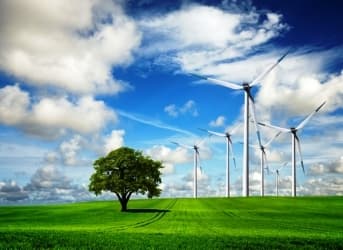A new report from UBS finds that renewable energy and energy storage are together presenting a “perfect storm” for big utilities. The declining cost of solar, energy efficiency, and electric vehicle technologies threaten to upend centralized electricity generation, putting the utility business model in jeopardy. Grid parity has already been achieved in certain parts of the world where conventional electricity rates are high and renewable resources are plentiful.
Renewable energy is beginning to cut into the bottom line for U.S. utilities. The average price for solar PV modules declined by 80% between 2008 and 2012. Net metering policies and innovative financing schemes like SolarCity’s leasing model are making distributed generation – where consumers generate power on-site – much more financially viable. This leads to a utility “death spiral,” in which utilities begin to lose customers, forcing them to jack up rates to cover lost revenue, which in turn pushes more people away. As of 2011, about three-quarters of U.S. utilities had a BBB credit rating or worse, indicating a striking lack of confidence in their financial future. In 2000, less than 40% of utilities earned such an abysmal grade.
Related article: What China's Energy Trajectory Says about Climate Change
This concept is not new, but UBS’ report suggests the trend is picking up steam, particularly in developed markets with flat electricity demand including parts of the United States, Europe, and Australia. Data from the Energy Information Administration (EIA) shows that electricity sales have declined in four of the last five years in the U.S. While some of the drop off is attributable to the financial crisis and subsequent recession, energy efficiency and distributed generation are playing a key role. According to the EIA, “[g]rowing installed capacity of behind-the-meter sources of generation (largely from rooftop solar) is displacing some electricity sales that would otherwise occur.”
The latest UBS report finds that not only is solar PV eating into the utilities’ customer base, but it is also shaving off peak demand. Solar generates the most output during mid-afternoons, when demand is at its highest. With variable costs for renewables essentially nil, they beat out more expensive fossil fuel units. The result is leading to curtailed generation from big power plants along with lower peak electricity prices – a nightmare for utilities.
The unfolding transition to cleaner energy will force utilities to respond in a few ways. Some are fighting incentives that promote clean energy, as seen in the brutal fight in Arizona over its net metering policy. Another approach is for utilities to get into the clean energy game, which many have been doing for some time. The latest example came on December 16 when Warren Buffet’s MidAmerican Energy placed a $1 billion order for wind turbines in Iowa, as “a hedge for our customers going forward in an era of reduced coal generation,” according to MidAmerican’s CEO Bill Fehrman.
Related article: Tasmania Seeking 100% Renewable Energy by 2020
Yet another approach is to scale back generation and embrace the bold new world of distributed generation. In Germany, several utilities have announced power plant closures and are considering transitioning into a model where they offer energy “services,” such as trading and advice to customers, according to The Economist. Germany may be a harbinger of the future – in June 2013 prices actually went negative because of so much green power on the grid at one time. Germany’s two biggest utilities, E.On and RWE, have both seen their net income drop by one-third since 2010.
Earlier this year NRG CEO David Crane warned about the looming decline of the Big Utility, arguing that distributed generation poses a “mortal threat to the existing utility system.” More telling was a January 2013 report from the Edison Electric Institute, a trade group for utilities, which concluded that distributed generation presents a “game changer” – strong words from an organization with an interest in preserving the confidence of investors. Add to the pile the latest UBS report, which concludes that utilities will not be able to survive in their current form.
ADVERTISEMENT
By. Nick Cunningham



















But only because of perversions built in by stupid law. Subsidized unreliable power with a 5 minute auction is JPS! (Just Plain Stup... uhmm ... Silly)